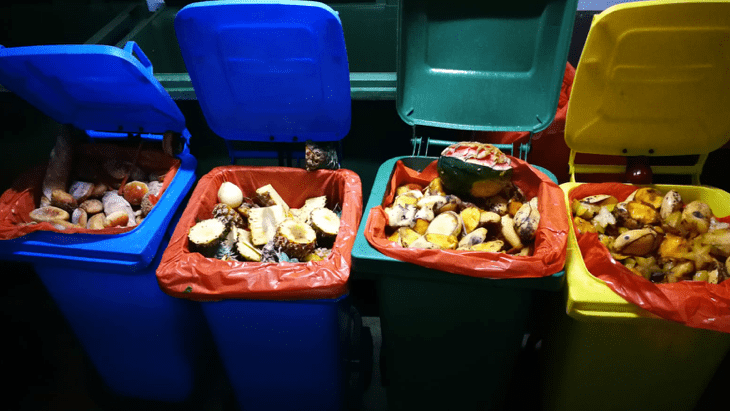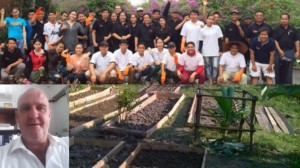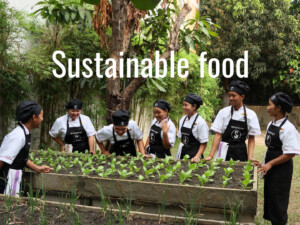Save money, satisfy guests, & join the fight against food waste

Sustainability advocate and “waste fighter” Lauren Kharouni presents the case against food waste, the business case for reducing it, and simple ways to start.
Have you ever taken a closer look at data on global food waste? If not, take a seat, the numbers are striking. Otherwise, a short reminder could not hurt.
Every year, the UN Food and Agriculture Organization estimates that a third of food produced for human consumption is wasted.
- From a social perspective, this is a heartbreaking paradox as it would be enough to feed three billion people.
- From an environmental perspective, think about all resources (land, water, energy, labor) required to produce, store, process and distribute food products. Did you know that more than 17,000 liters of water are required to get 1 kg of your favorite chocolate bar? In the end, all these natural resources also end up in the bin, being uselessly exploited. Actually, if food waste was a country, it would be the third biggest greenhouse gas emitter, right after the United States and China.
- From an economic perspective, Boston Consulting Group (BCG) estimates that this global food waste is worth $1.2 trillion.
In the hospitality industry up to 40% of all food purchased is thrown into the bin. This is according to our estimates based on customers’ case studies.
Taking action to tackle food waste is key to improving the environmental and social performance of organizations — my main concern as a sustainability advocate — but also their economic performance — the main concern of business managers.
To put it simply, throwing away food is throwing away money. Tackling food waste makes business sense!
The business case for reducing food waste

At LightBlue Environmental Consulting we have seen food waste prevention programs cut food waste per cover (per guest) by up to 12 percentage points.
Furthermore, consumers are increasingly concerned about the environmental and social impacts of their consumption practices, and most of them want to walk the talk while traveling.
- 48% of people rate food waste as one of their most pressing sustainability concerns (ThoughtWorks consultancy firm, 2018)
- 95% of business travelers surveyed believe the hotel industry should be undertaking ‘green’ initiatives (Hospitality 2015 report by Deloitte)
When hotels reduce food waste and find innovative ways to reuse or transform leftovers, they can (1) meet emerging demand, (2) improve / anticipate customers satisfaction, and (3) manage reputation risk.
Three barriers to reducing food waste
So, why is there no global movement yet within the hospitality industry to tackle food waste strong and fast?
We could highlight three main preconceived ideas constituting barriers to overcome. Let’s investigate if you are subjected to one of them.
The perception gap
“I have very low / no food waste in my operations.”
Do you know precisely how much food is wasted through your operations and what are the associated costs? Food businesses with no food waste monitoring system tend to underestimate the quantity of food wasted and the associated financial impact by a factor of 5 to 10.
Lack of knowledge
“I offer neither buffets nor breakfast. I am not concerned by food waste.”
When you think about food waste in your operations, do you believe that buffets and breakfast are where all waste occurs? Well, most players misunderstand food waste in their operations. In fact, up to 50% of food waste happens before consumers even see the food. Buffet waste accounts for only 15 to 20% of all food waste. And breakfast is actually the most efficient shift in terms of food waste management.
Incomplete Key Performance Indicators (KPIs)
“My food operations are efficient. I have a good food cost percentage”
The food cost percentage indicator is widely used in the industry. It is of course very interesting to define a pricing policy. However, food cost percentage does not reflect how well food businesses are utilizing food as a resource. Do you look at other KPIs to have a better understanding of your level of efficiency?
Join the fight against food waste

Here are some things you can do now to join the fight against food waste:
- Implement a food waste monitoring system and assess your performance
- Define a clear food waste prevention strategy and action plan
- Analyze your food management practices and identify relevant best practices
- Raise your staff awareness and train them on new practices
- Find innovative food waste solutions while keeping in mind the food waste pyramid (see above)
- REDUCE: the first objective is to prevent food waste before it occurs
- REDIRECT: for human consumption, animal feed, or secondary markets for industrial use (e.g. natural textile made from pineapple leaf fiber)
- REPURPOSE: compost, transform into energy, transform into cleaning products
- Adopt a comprehensive framework and get your effort recognized by the PLEDGE on Food Waste.
For inspiration, discover how Pullman Bangkok succeeded in saving 21,000 kg of food and reducing its food cost per cover by 6% within five months.
Featured image: How many organic waste bins do you use? How much food is your tourism or hospitality business wasting? Image copyright: © LightBlue Environmental Consulting
About the author

To complement the business strategy and management at the heart of her education, Lauren Kharouni chose sustainability as her area of expertise. Appalled at tourism’s waste footprint, Lauren joined LightBlue Environmental Consulting, a Bangkok-based social enterprise that supports the hospitality sector in adopting sustainable practices that make business sense, particularly food waste prevention. She is also a certified sustainable tourism auditor.





